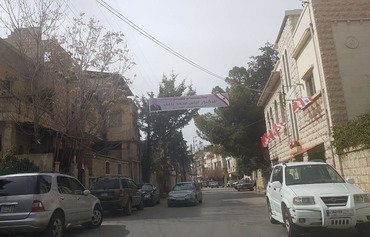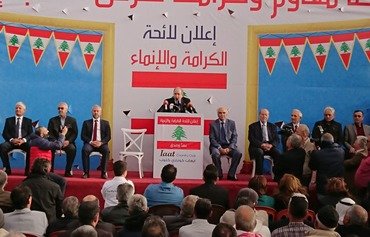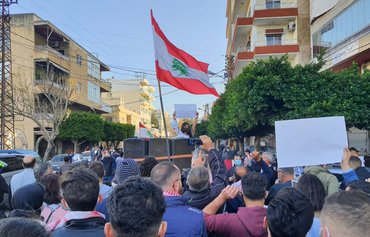BEIRUT -- Opposition to Hizbullah is coming out into the open in areas of Lebanon under the influence of the Iran-backed party, particularly the Bekaa Valley's Baalbek-Hermel region.
Residents and religious scholars do not hesitate to criticise the party, among them Sheikh Abdul Salam Dandash of Hermel, who recently launched a stinging attack on Hizbullah chief Hassan Nasrallah and top party officials.
"Your resistance is awash with dollars while our resistance is mired in hunger and poverty," he said, addressing the party's leadership.
"You resist with excess and arrogance, and we resist your lies and the disease and ignorance that you have bequeathed to the region," he added.
![Protests that erupted in Lebanon in late 2019 against the corrupt leadership reached Hizbullah areas in the Bekaa Valley. [Al-Mashareq]](/cnmi_am/images/2022/03/03/34255-lebanon-protests-600_384.jpg)
Protests that erupted in Lebanon in late 2019 against the corrupt leadership reached Hizbullah areas in the Bekaa Valley. [Al-Mashareq]
![Shia demonstrators protest in Tyre, in southern Lebanon, in late 2019. Hizbullah violently suppressed Shia popular movements in Tyre, Nabatiyeh and Baalbek since their outbreak in 2019. [Al-Mashareq]](/cnmi_am/images/2022/03/03/34258-protest-tyre-600_384.jpg)
Shia demonstrators protest in Tyre, in southern Lebanon, in late 2019. Hizbullah violently suppressed Shia popular movements in Tyre, Nabatiyeh and Baalbek since their outbreak in 2019. [Al-Mashareq]
Shia opposition to Hizbullah's hegemony has existed "in Hizbullah's areas of influence since its inception", Islamic Arab Council secretary-general Mohammed Ali al-Husseini told Al-Mashareq.
This opposition has grown in recent years, however, as all the guises Hizbullah has used to conceal its true motives have been gradually stripped away, he said.
"The notion of the 'resistance party' became obsolete after the Israeli withdrawal from Lebanon, as has the notion of the party that combats takfiri terrorism, after its and Iran's failure to beat back terrorism in Syria," he said.
"The notion of the 'defender of people's rights' was debunked after it became clear to everyone that Hizbullah is a full partner in the corrupt authority that bankrupted Lebanon," al-Husseini said.
"It established its state within the state, with a parallel economy and alternate treasury that impoverished the country and its people," he added.
Hizbullah violently suppressed Shia popular movements in Tyre, Nabatiyeh and Baalbek, because of its inability to convince the Shia community of the validity of its position and because of its ability to solve their problems, al-Husseini said.
"In fear of losing its former momentum and the control it had, it is ramping up its resistance rhetoric once again, with parliamentary elections drawing closer," he said.
The opposition is an established fact, and the party will not be able to abolish it, he said. Yet the opposition will not be able to achieve a political breakthrough in the elections, given the dominance of Hizbullah's weapons, al-Husseini predicted.
Opposition at all-time high
Shia opposition to the Hizbullah/Amal duo in Baalbek-Hermel "is at an all-time high", said a prominent Shia opposition figure from the Baalbek region, who asked that his name be withheld.
He noted that the region has been a strategic focus for Hizbullah and Iran's Islamic Revolutionary Guard Corps (IRGC) since 1982, as it has a Shia majority population.
Resentment prevails among the Shia in these areas, he said, "because the majority of them are farmers who are drowning in debt as they are unable to sell their crops to foreign markets".
The Shia opposition made its presence felt in the last municipal and parliamentary elections, the source said, going up against Hizbullah and achieving a breakthrough by winning two seats in Baalbek.
It is working with civil organisations, independent candidates and groups who support the popular protests to form a list to go up against Hizbullah and the Lebanese authorities currently in power in the next elections in May, he said.
It also is taking advantage of the political climate and popular resentment over the performance of the region's lawmakers and their sponsorship by the Hizbullah/Amal duo, aiming to steer voters away from them.
Resisting Hizbullah's hegemony
According to "Jihad", a youth from a northern Bekaa Valley village that is controlled by Hizbullah, local opposition to the party "has no limits".
"Hizbullah deprives us of development and social and employment services, and it imposes its hegemony over Lebanon's Shia with its weapons and intimidation", he told Al-Mashareq, asking that his last name be withheld for fear of reprisal.
He said Hizbullah's primary project is to make Lebanon a conduit for Iran's agenda in the region, noting that it has succeeded in this effort because there has been no real resistance.
A retired secondary school teacher who gave his name as simply "Mohammed" told Al-Mashareq the Hizbullah/Amal duo "has spread corruption and rules Lebanon and controls the Baalbaki decision".
"Because of them we are facing dire financial circumstances and deprivation of aid and health services, access to which is subject to favouritism by the party, while its officials are awash with dollars," he said.
Hizbullah "monopolises -- by force -- representation of the Shia community", Southerners for Freedom Movement co-ordinator Hussein Ataya said.
Lebanese Shia have become "a mere accessory to its policy", he said, noting that "the mood among the sect's members throughout Lebanon has changed".
"They have decided to turn to confrontation after a long silence, because they are part of the fabric of Lebanon, and their Arab affiliation stands as a barrier against affiliation with Iran," he said.

![Posters of Hizbullah chief Hassan Nasrallah are prevalent in the militia's strongholds in the Baalbek-Hermel region, but opposition to the group is growing within the Shia community itself. [Al-Mashareq]](/cnmi_am/images/2022/03/03/34257-posters-bekaa-600_384.jpg)






